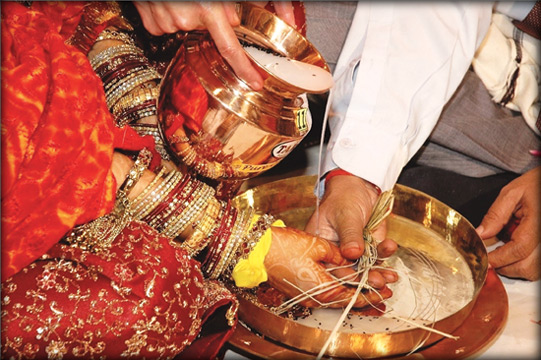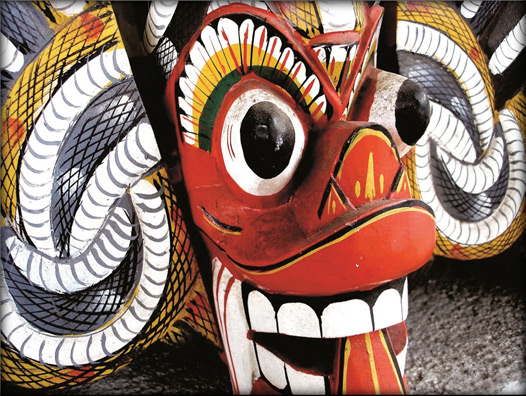Positive superstitions make sense
by Lionel Wijesiri
After all this modernisation that has taken place, superstitious
beliefs still persists in all societies. Sri Lanka is no exception.
There is no culture that is totally free from superstitious beliefs and
practices.
|

There are various wedding-related rituals and ceremonies,
which may or may not be superstitious and are usually
carried out |
It is interesting to consider why people’s belief in superstitions
persists in the world in spite of the most amazing discoveries and
inventions of modern science and technology. Obviously, ignorance and
fear play a significant role in generating and propagating
superstitions.
If we were to study superstitions we can find an answer to this
question. New studies have revealed that stress makes people not only
believe in rituals and as a result, they are more likely to “see” things
that actually do not exist. A feeling of lack of control over the life
fuels many people’s desire to impose order and structure on the world.
Feelings of control are so essential to people that a lack of control
is menacing. While some misconceptions can be bad or lead one astray,
they are awfully common and most likely satisfy a deep and enduring
psychological need. People who constantly worry about their lives or
have a strong need of control are more vulnerable for being
superstitious.
Dr Cecilia D. Felice, a clinical psychologist and author of the
best-seller Dare to be you says: “We are becoming more anxious because
life is getting more stressful. Our expectations of ourselves are
higher, and the pace of life is now so fast and fragmented.
When you’re running on empty, you’re more likely to develop control
issues and look for ways to alleviate fear, which is what leads to
“magical thinking” - the idea that we can somehow ensure a good outcome
by performing certain rituals.”
Role of superstitions
Superstitions have come a long way in history and have been evolved
in this process. Every known civilisation that ever existed on the
planet had something common in them; these were the myths and
superstitions that were a crucial part of their cultures. Modern
sociologists believe there is no harm in adhering to some of the
superstitions and rituals.
The role of ritual is needed by everyone as a form of reassurance,
helping to express feelings of doubt and relieve anxiety. In this sense,
superstitions are one of life’s better props. In fact, many profess to
see a great similarity between the beliefs and rituals of superstitions
and those of traditional religious institutions.
Classification
However, social scientists define superstition as a belief,
half-belief, or practice for which there appears to be no rational
substance. Those who use the term may imply that they have certain
knowledge or superior evidence for their own scientific, philosophical,
or religious convictions. Social scientists maintain that it an
ambiguous word, and it cannot be used except subjectively.
With this qualification in mind, superstitions may be classified
roughly as religious, cultural, and personal.
Every religious system tends to accumulate superstitions as
peripheral beliefs - a Christian, for example, may believe that in time
of trouble he will be guided by the Bible if he opens it at random and
reads the text that first strikes his eye.
Often one person’s religion is another one’s superstition:
Constantine, the Emperor of Rome, called paganism, a superstition; a
Tacitus, the Roman historian, called Christianity a deadly superstition;
Roman Catholic veneration of relics, images, and the saints is dismissed
as superstitious by many Protestants; Christians regard many Hindu
practices as superstitious; the followers of Buddhism and Hinduism,
might believe that certain rituals in Abrahamic religions are
superstitions.
Finally, all religious beliefs and practices may seem superstitious
to the person without religion.
Superstitions that belong to the cultural tradition (in some cases
inseparable from religious superstition) are enormous in their variety.
Many persons, in nearly all times, have held, seriously or
half-seriously, irrational beliefs concerning methods of warding off ill
or bringing good, foretelling the future, and healing or preventing
sickness or accident.
A few specific folk traditions, such as belief in the evil eye or in
the efficacy of amulets, have been found in most periods of history and
in most parts of the world. Others may be limited to one country,
region, or village, to one family, or to one social or vocational group.
Finally, people develop personal superstitions: a schoolboy writes a
good examination paper with a certain pen, and from then on that pen is
lucky; a horse player may be convinced that grey horses run well for
him.
Research
A large body of research has attempted to develop theories about the
function and origin of superstitious beliefs on the basis of the
psychological correlates of such beliefs. Most of this work has measured
superstitious belief using the Paranormal Belief Scale (PBS), and has
tended to find that superstitious belief is associated with poor
psychological adjustment.
For example, let us take three items of the superstition sub-scale of
the PBS: Howling of dogs at midnight will bring bad luck, if you break a
mirror, you will have bad luck, and, the number 13 is unlucky.
|

Devil dancing in a ritual found in thovil ceremonies. |
All these items refer to beliefs that can be classified as negative
superstitions, that is, they all reflect the notion that certain
behaviour (e.g., breaking a mirror) or omens (e.g., seeing a black cat)
are magically associated with unlucky and potentially harmful
consequences.
Given that this is the case, it is perhaps not surprising that, such
beliefs are associated with poor psychological adjustment as
self-efficacy and high anxiety. However, not all superstitious beliefs
fall into this category. Some, such as carrying a charm to bring good
luck, reflect a desire to bring about beneficial consequences by
actively courting good luck or at least avoiding bad luck.
Such positive superstitions may serve different psychological
functions to negative superstitions. Indeed, as is the case with other
forms of so-called ’positive illusions’ beliefs in these types of
superstitions may actually be psychologically adaptive rather than
maladaptive.
Michael Shermer, the publisher of Sceptic Magazine, holds that the
superstitious way of thinking will never leave us because it will not be
a threat to our biological survival.
In fact, our tendency to link cause and effect can be beneficial
rather than harmful from a survival point of view: a prehistoric man
would hide on hearing rustling of grass taking it as a sign that a
predator was approaching. Even if his connecting the rustling noise with
the presence of a predator later turned out to be wrong this error would
not harm him.
The sharing of such wrong cause-effect connections (i.e.
superstitions) may give a sense of social cohesion to a community. They
bind the members together by making them toe the line. |

